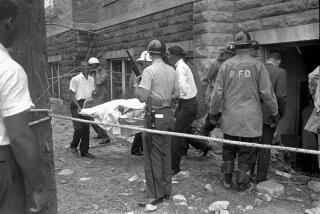Scars Stay as Quiet Northern Irish Town Rebuilds From Another Bomb
WARRENPOINT, Northern Ireland — The roof is back on Charlie Wills’ gas station, Pat Rice is back in his house, and it takes a second look to see the scars that an IRA bomb left on Mariann Cooper’s face.
The scars on the town, though, are still raw: a hole next to the police barracks on Charlotte Street where a hardware store and Cooper’s home once stood; the “For Sale” signs on two boarded-up houses; the flowers outside the police station for Joanne Reilly, killed in her 20th year.
Warrenpoint, about 40 miles south of Belfast and just across the border from the Irish Republic, has been through this before. But it has become a microcosm of the personal tragedy faced by people and towns in Northern Ireland’s 20 years of fighting between the forces loyal to Britain and the partisans of Irish unity.
The news reports and broadcasts tell of the death and destruction; time passes, and then the people are alone in their mourning and loss.
More than 2,700 people had been killed before Joanne Reilly was killed in Warrenpoint last April 12. While Warrenpoint has tried to rebuild, 47 more have died in Northern Ireland.
The British government last year paid out 11.6 million pounds, the equivalent of $19.7 million at current exchange rates, in compensation for personal injuries caused by the conflict, and 20.6 million pounds ($35 million) for property damage, according to the Northern Ireland Office.
Mariann Cooper was about 50 feet away from a bomb big enough to damage houses a mile away. She is now deaf in her left ear, has only partial sight in her left eye and faces more plastic surgery on her face.
That explosion at 10 minutes to 10 on a Wednesday morning is like a videotape running and re-running in her head.
“That’s the only way I can explain it,” she said.
She keeps a big folder of newspaper clippings about the disaster, and insists that she wants to forget.
“Having said forget, I’d like people to remember it happened. Why it happened. It happened for no reason.”
Cooper is a Roman Catholic; her husband, Stuart, is a Protestant living through a conflict that has pitted Catholic against Protestant.
“It doesn’t make a difference in Warrenpoint,” Cooper said.
The bomb that disrupted their lives was packed into a stolen Toyota van that was driven into a yard behind the Heatley and Morgan hardware store--next to the police barracks.
Reilly, working in the back of the store, was killed instantly; at least two dozen people were injured badly enough to require hospital treatment, and 32 families were put out of their homes. The Daisy Hill hospital was already receiving the wounded when the Irish Republican Army gave its first telephone warning.
The IRA later said the bomb exploded prematurely and offered “sincerest apologies” to the bereaved and the injured.
“Even if we had two hours’ notice and cleared the entire town of Warrenpoint . . . you still would have had 364 premises damaged,” said Jim McCart, a member of the county council.
That is one of every six homes in Warrenpoint, a town of 5,600 people, 85% of whom, including the dead woman, are Catholics. It’s a stronghold of support for the Social Democratic and Labor Party, which rejects violence but shares the IRA’s goal of a united Ireland.
The bomb did little damage to the police barracks, which is surrounded by high walls and barbed wire and is protected from mortars and missiles by a steel roof.
Charlotte Street “was a happy enough street, everybody got along with everybody,” said Rice, who had spent a decade renovating his house across the street from the police station.
Warrenpoint had been hit before: the Crown Hotel was bombed and is just a vacant lot; the Ulster Bar and the post office were rebuilt after bombings; the Seven Steps hotel along the shore of Carlingford Lough is still charred and gaping.
An IRA bomb outside town, near the ruins of Narrow Water Castle, killed 18 British soldiers Aug. 27, 1979--the same day another IRA bomb killed Earl Mountbatten of Burma, a cousin of Queen Elizabeth II.
After the latest attack, “people supported each other a lot,” said Richard Black of the social services office in nearby Newry.
“There was a great groundswell of opinion in Warrenpoint that they were quite determined to get on with life and live as normally as possible, and that did gel a lot of the families together,” he said.
The flip side of determination, though, is resignation.
“We’ve learned to live with it,” Black said. “I think people have become very weary as well. There seems to be no light at the end of the tunnel.”
Among the flowers that still cover Joanne Reilly’s hilltop grave in St. Peter’s Cemetery are two small potted pines, one with a tiny Santa Claus, and a big display saying “Happy Birthday, Sis.”
Before her 21st birthday Sept. 24, relatives and friends filled three columns of the Newry Reporter newspaper with memorials.
Beneath a picture of a lively, smiling, dark-haired young woman were poems from her parents, Ann and Paul, her brothers Paul and Martin, her pal Michelle, her boyfriend, Sean, her aunts and uncles and cousins. Paul Reilly’s message said: “My heart still aches, I whisper low, ‘God bless you Sis, I love you so.’ ”
The hardware store and the Coopers’ house will not be rebuilt. One other house may be demolished. Joanne Reilly’s grandmother is among those who have not moved back to Charlotte Street.
Just after the bombing, Geraldine McShane advertised a “Bomb Damage Sale” at the Pick ‘n’ Mix shop. In the summer, she had a going out of business sale.
“Well, I would say the bomb was 50% responsible,” she said. “No one was coming down that side at all after the bomb.”
The government compensated her for the soft toys that couldn’t be sold because they were full of splintered glass.
The bomb blew the roof off Wills’ gas station and caused two months of anxiety for him and his three employees--three important jobs in a town where unemployment is estimated to approach 25%.
“It’s just like it was, maybe better, it is indeed,” he said. “We just renovated the place while we’re at it. It’s not like I wanted, but we’ll get there.”
More to Read
Sign up for Essential California
The most important California stories and recommendations in your inbox every morning.
You may occasionally receive promotional content from the Los Angeles Times.










